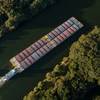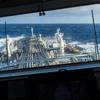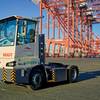Seaborne Box Trade to Remain Flat: MPC
Growth in global seaborne box trade is expected to remain largely constant in 2019, with Non-Mainlane trade being an important driver while Mainlane trades expected to expand only moderately, said Norway-based MPC Container Ships ASA.
In particular, the pace of global manufacturing remains a cause for concern as growth rates in Europe and Asia have been disappointing, the owner and operator of container ships said in a stock exchange annoucement.
Present year container trade is estimated to grow by about 3.6%, whereas Transpacific trades grow by 0.5%, Far East Europe trades with 2.0% North-South trades with 3.7%, Other East-West with 4.1% and Intra-Regional trades with 4.9%.
Trade tariffs and the threat thereof will remain a key issue in 2019. Even threatened measures can have real effects by increasing uncertainty and discouraging investments.
The implications of a major trade war between China and the United States are likely to go far beyond trade barriers, as they will affect a number of industries globally and could well lead the global economy into recession.
Moreover, global economic growth projections have been adjusted downwards recently, with e.g. the International Monetary Fund now forecasting 3.3% and 3.4% for 2019 and 2020, respectively.
For 2019, container trade growth projections range from 3.0% to 3.8%, representing a relatively healthy level in the base case, which is generally subject to an escalation of trade tensions.
The economic environment remained challenging, as reflected by the downward revision of demand growth in the largest trades, leading to a lower-than-anticipated container trade growth of 3.6% for the year as a whole (2018: 4.2%) according to research institutions.
Container shipping continues to face an exceptionally high degree of uncertainty, ranging from the additional costs associated with the January 2020 implementation date of the International Maritime Organization’s sulphur emission cap regulation to the possibility of a trade recession, in particular due to ongoing US-China tensions.













